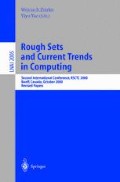Abstract
This paper presents the RClass system, which was designed as a tool for data validation and the classification of uncertain information. This system uses rough set theory based methods to allow handling uncertain information. Some of proposed classification algorithms also employ fuzzy set theory in order to increase a classification quality. The knowledge base of the RClass system is expressed as a deterministic or non-deterministic decision table with quantitative or qualitative values of attributes, and can be imported from standard databases or text files.
Access this chapter
Tax calculation will be finalised at checkout
Purchases are for personal use only
Preview
Unable to display preview. Download preview PDF.
References
Anderson E. “The IRISes of the Gaspepenisula” Bull. Amer. IRIS Soc., 59, 2–5, 1935
Grzymala-Busse J.W. “Classification of Unseen Examples under Uncertainty”, Fundamenta Informaticae 30, 1997
Drwal G., Mrózek A. “System RClass-Software Implementation of the Rough Classifier” 7th International Symposium on Intelligent Information Systems, pp. 392–395, Malbork 1998
Mayer B. “Object-Oriented Software Construction”, Engewood Clif, New York, Prentice Hall, 1988
Mrózek A. “Use of Rough Sets and Decision Tables for Implementing Rule-based Control of Industrial Process”, Bulletin of the Polish Academy of Sciences T.S., 34, 1986
Nauck D., Kruse R. “A Neuro-Fuzzy Method to Learn Fuzzy Classification Rules from Data” Fuzzy Sets and Systems 89, pp. 277–288, Elsevier Science, 1997
Pawlak Z. “Rough Sets” International Journal of Computer and Information Sciences, 1982
Polkowski L., Skowron A. “Rough Mereological Foundations for Design, Analysis, Synthesis and Control in Distributed Systems”, Information Sciences, vol. 104, Numbers 1–2, 1998
Polkowski L., Skowron A., Zytkow J. “Tolerance Based Rough Sets”, Proc. of Third International Workshop on Rough Sets and Soft Computing, San Jose State University, CA, 1994
Stepaniuk J. “Rough Sets Similarity Based Learning”, Proc. of 5th European Congress on Intelligent Techniques & Soft Computing, 1634–1638, Aachen, 1997.
Zadeh L.A. “Fuzzy Sets”, Information and Control, Vol. 8, 1965
Zadeh L.A. “Outline of a New Approach to the Analysis of Complex Systems and Decision Processes” IEEE Transaction on Systems, Man, and Cybernetics SMC-3, 1973.
Author information
Authors and Affiliations
Editor information
Editors and Affiliations
Rights and permissions
Copyright information
© 2001 Springer-Verlag Berlin Heidelberg
About this paper
Cite this paper
Drwal, G. (2001). Rough, and Fuzzy-Rough Classification Methods Implemented in RClass System. In: Ziarko, W., Yao, Y. (eds) Rough Sets and Current Trends in Computing. RSCTC 2000. Lecture Notes in Computer Science(), vol 2005. Springer, Berlin, Heidelberg. https://doi.org/10.1007/3-540-45554-X_18
Download citation
DOI: https://doi.org/10.1007/3-540-45554-X_18
Published:
Publisher Name: Springer, Berlin, Heidelberg
Print ISBN: 978-3-540-43074-2
Online ISBN: 978-3-540-45554-7
eBook Packages: Springer Book Archive

